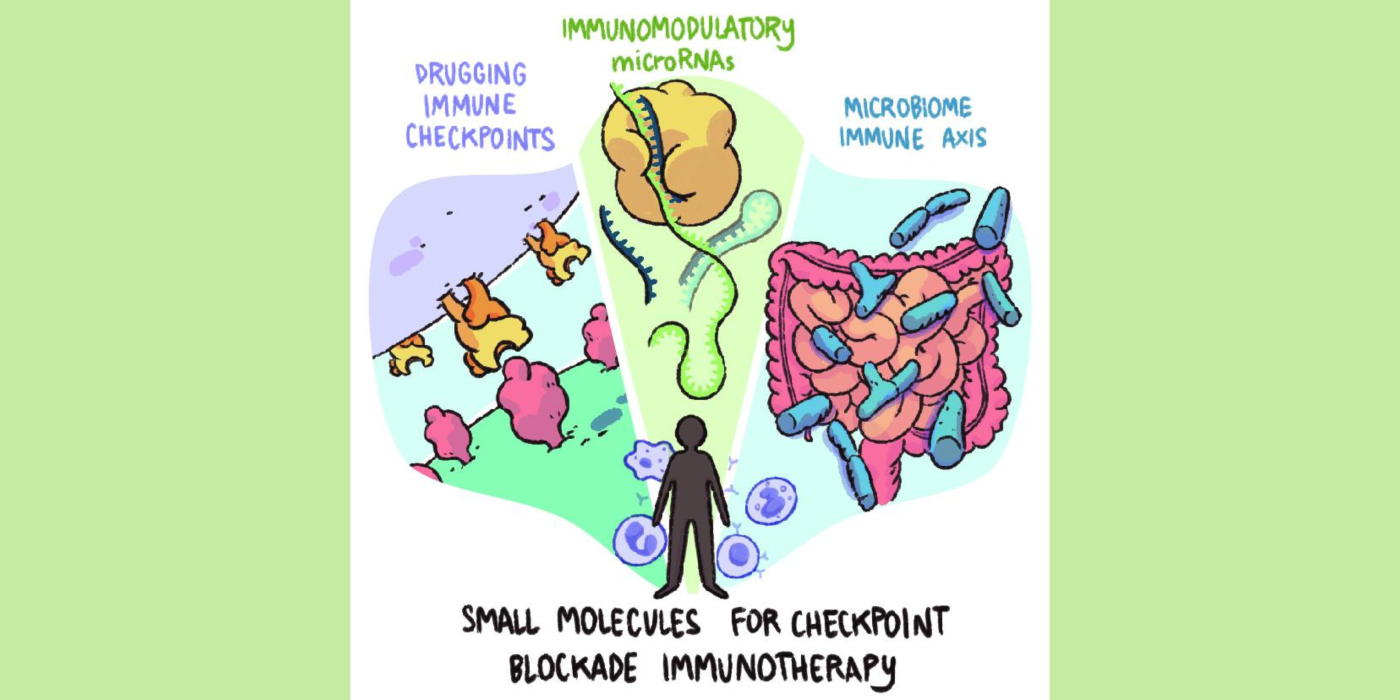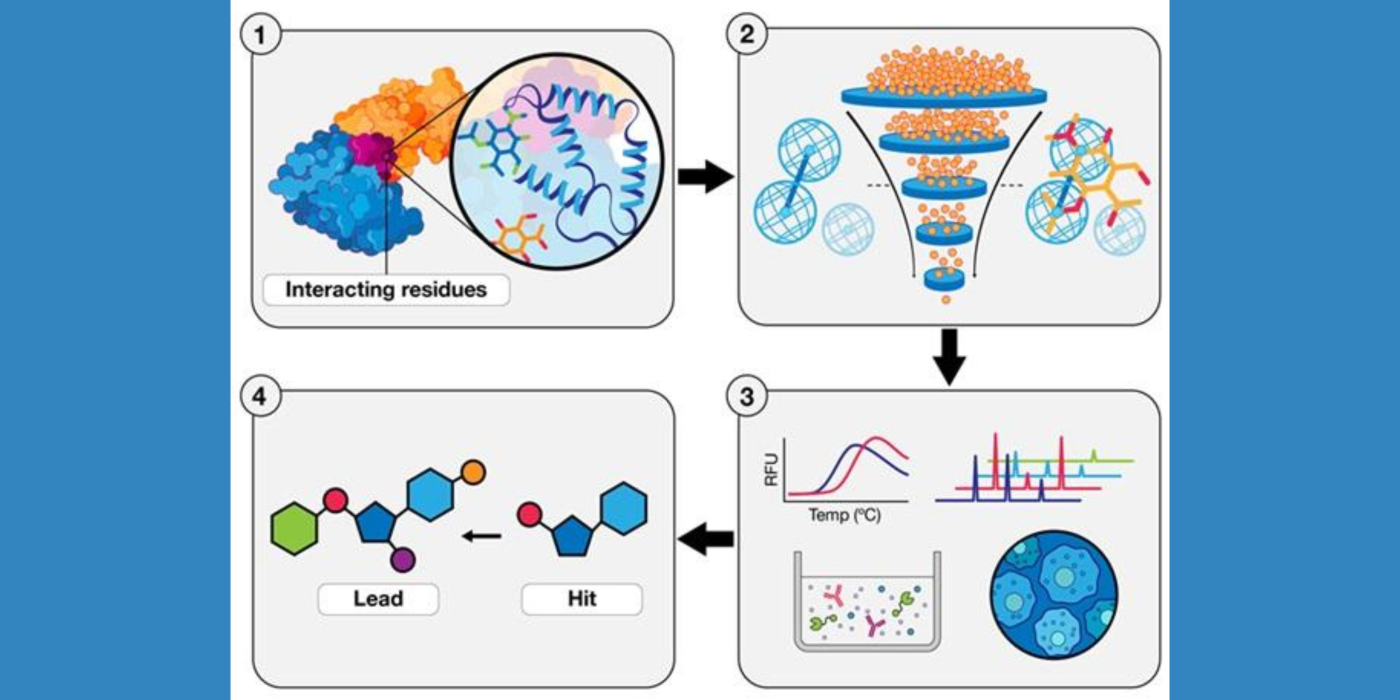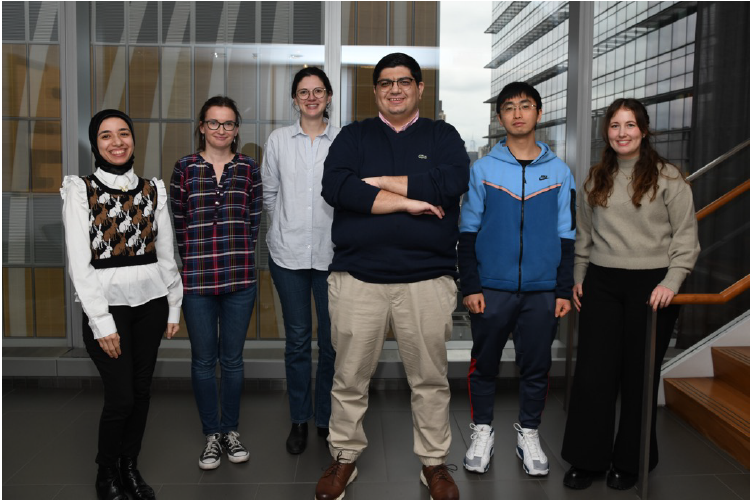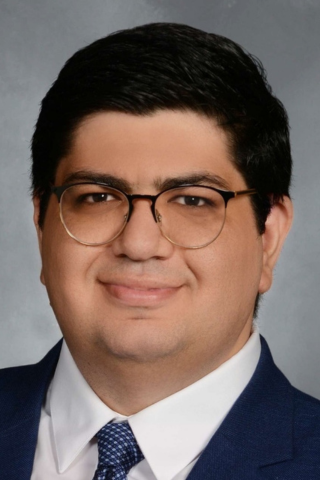

Antibody pharmacophore (SMAP) small molecules
(1) Identify key residues from monoclonal antibody (mAb)-immune checkpoint cocrystal structure, then move on to: (2) pharmacophore-based virtual screening, (3) hit validation, (4) hit-to-lead validation.

The overarching goal of the Gabr Lab is to develop new tools for the discovery and development of small molecules that can monitor and/or modulate the human immune response to cancer and neurodegenerative diseases. The lab's research is focused on the following broad and fundamental questions: (1) Are small molecules and immunotherapy compatible? (2) What are the most efficient tools to identify small molecule immunomodulators with potential for clinical translation? Current projects are broadly broken down into three main areas: (1) Targeting the interaction between cancer cells and immune checkpoints expressed on immune cells. (2) Harnessing gut microbial metabolism to modulate host’s immune response to cancer. (3) Development of new tools to control the biogenesis of microRNAs (miRNAs) implicated in modulating the immune system.
Associated Lab Members

Dr. Gabr completed his undergraduate studies in pharmaceutical sciences at Mansoura University. As an undergraduate student, he pursued research internships at the Complutense University of Madrid and the Chinese Academy of Sciences. After earning his master’s degree in medicinal chemistry and drug design in a joint program between Georgia State University and Mansoura University, he earned his Ph.D. in chemistry from the University of Iowa. His Ph.D. work focused on developing fluorescence-based theranostics for cancer and neurological disorders. Dr. Gabr completed his postdoctoral studies in the Gambhir lab at Stanford University where his work focused on developing small molecule immunomodulators as well as carbohydrate-based positron emission tomography (PET) tracer for molecular imaging of early bacterial infections.

Laura Calvo Barreiro, Ph.D., graduated in biotechnology from the University of Leon, Spain, in 2013. As an undergraduate student, she honed her skills through internships at Exopol, a biotechnology company located in Zaragoza, Spain, and ITQB NOVA in Lisbon, Portugal. Her academic pursuits led her to Autonomous University of Barcelona, where she earned a master's in biomedical research, followed by a doctorate at Vall d'Hebron Institute of Research under the guidance of Dr. Carmen Espejo. Her doctoral research delved into the interplay between the gut microbiota and multiple sclerosis, laying the foundation for her keen interest in immune modulation and tolerance. Joining the Moustafa Gabr Lab in 2022 as a postdoctoral associate, Dr. Calvo Barreiro now focuses on uncovering novel small molecules targeting immune checkpoints while maintaining her passion for investigating the role of the gut microbiota and gut microbiota-derived metabolites in immune regulation.
Key research interests: immune tolerance, autoimmunity, immunotherapy

Key research interests: Covalent checkpoint inhibitors, Biophysical screening methods in drug design, Assay development

Longfei Zhang, Ph.D., completed his undergraduate studies at Lanzhou University and earned his doctorate from Beijing Normal University in radiopharmaceutical chemistry. In his Ph.D. work, Dr. Zhang focused on developing PSMA-targeting NIR-II fluorescence probes for intraoperative surgery navigation and fluorescence or radioactive probes for Alzheimer's disease diagnosis.
Key research interests: molecular imaging, radiochemistry, drug discovery

Aikaterini Stavrou, MS, PhD, is a Postdoctoral Research Associate in the Gabr Lab at Weill Cornell Medicine. Her current research focuses on drug discovery in oncology, with a specific emphasis on immune checkpoint inhibitors for cancer treatments. Her work aims to identify novel therapeutic strategies that harness the immune system to combat cancer, addressing critical challenges in cancer treatment.
Dr. Stavrou earned her PhD in Molecular Toxicology and Carcinogenesis from New York University, with her doctoral research centered on cancer biology and the role of extracellular vesicles (EVs) in tumor microenvironments. Her work highlighted how EV-mediated signaling pathways contribute to cancer progression and metastasis. In addition to her PhD, she holds both an MS and a BS in Toxicology, providing a comprehensive background in understanding the safety and efficacy of therapeutic interventions. Her expertise in toxicology has given her a robust foundation for examining how cancer cells interact with their environment through EV-mediated signaling.
Throughout her academic career, Dr. Stavrou has demonstrated a passion for interdisciplinary research, merging her expertise in Toxicology, Cancer Biology, and molecular techniques to contribute to advancements in cancer treatment and drug discovery Her work contributes to a deeper understanding of cancer biology while exploring innovative strategies to develop more precise and effective cancer therapies Dr. Stavrou is dedicated to pushing the boundaries of cancer treatment through innovative research and collaboration in the scientific community.
The lab is applying an interdisciplinary approach that includes chemical biology, immunopharmacology, molecular imaging, structural biology, medicinal chemistry and screening technologies.
PI: Moustafa br
01/01/2023 – 12/31/2024
Title: Small molecule-mediated inhibition of T cell immunoglobulin and mucin domain 3 (TIM-3) as an immunotherapeutic strategy for Acute Myeloid Leukemia
PI: Moustafa Gabr
07/01/2023 – 06/30/2024
Title: First-in-class small molecule LAG-3 inhibitors for non-small lung cancer therapy
(1) Abdel-Rahman, S.A.; Rehman, A.U.; Gabr, M.T. Discovery of first-in-class small molecule inhibitors of lymphocyte activation gene 3 (LAG-3). ACS Med Chem Lett. 2023, 14(5), 629-635.
(2) Abdel-Rahman, S.A.; Talagayev, V.; Pach, S.; Wolber, G.; Gabr, M.T. Discovery of small-molecule TIM-3 inhibitors for acute myeloid leukemia using pharmacophore-based virtual screening. J Med Chem. 2023, 66(16), 11464-11475.
(3) Abdel-Rahman, S.A.; Zhang, L.; Gabr, M.T. Development of a high-throughput TR-FRET screening assay for LAG-3/FGL1 interaction. SLAS Discov. 2023, 28(4), 188-192.
(4) Calvo-Barreiro, L.; Talagayev, V.; Pach, S.; Abdel-Rahman, S.A.; Wolber, G.; Gabr, M.T. Discovery of ICOS-targeted small molecules using pharmacophore-based screening. ChemMedChem. 2023, 18(23), e202300305.
(5) Abdel-Rahman, S.A.; Świderek, K.; Gabr, M.T. First-in-class small molecule inhibitors of ICOS/ICOSL interaction as a novel class of immunomodulators. RSC Med Chem. 2023, 14(9), 1767-1777.
(6) Li, M.; Baumhover, N.J.; Liu, D.; Cagle, B.S.; Boschetti, F.; Paulin, G.; Lee, D.; Dai, Z.; Obot, E.R.; Marks, B.M.; Okeil, I.; Sagastume, E.A.; Gabr, M.T.; Pigge, F.C.; Johnson, F.L.; Schultz, M.K. Preclinical Evaluation of a Lead Specific Chelator (PSC) Conjugated to Radiopeptides for 203Pb and 212Pb-Based Theranostics. Pharmaceutics. 2023, 15(2), 414.
(7) Madhav, H.; Abdel-Rahman, S.A.; Hashmi, M.A.; Rahman, M.A.; Rehan, M.; Pal, K.; Nayeem, S.M.; Gabr, M.T.; Hoda, N. Multicomponent Petasis reaction for the identification of pyrazine based multi-target directed anti-Alzheimer's agents: In-silico design, synthesis, and characterization. Eur J Med Chem. 2023, 254, 115354.
Molecular PET tracer: F18-labeled CD73
Long-term goal: Monitoring CD73 status in cancer patients to provide helpful information for the selection of patients who would benefit from CD73-targeted therapy.